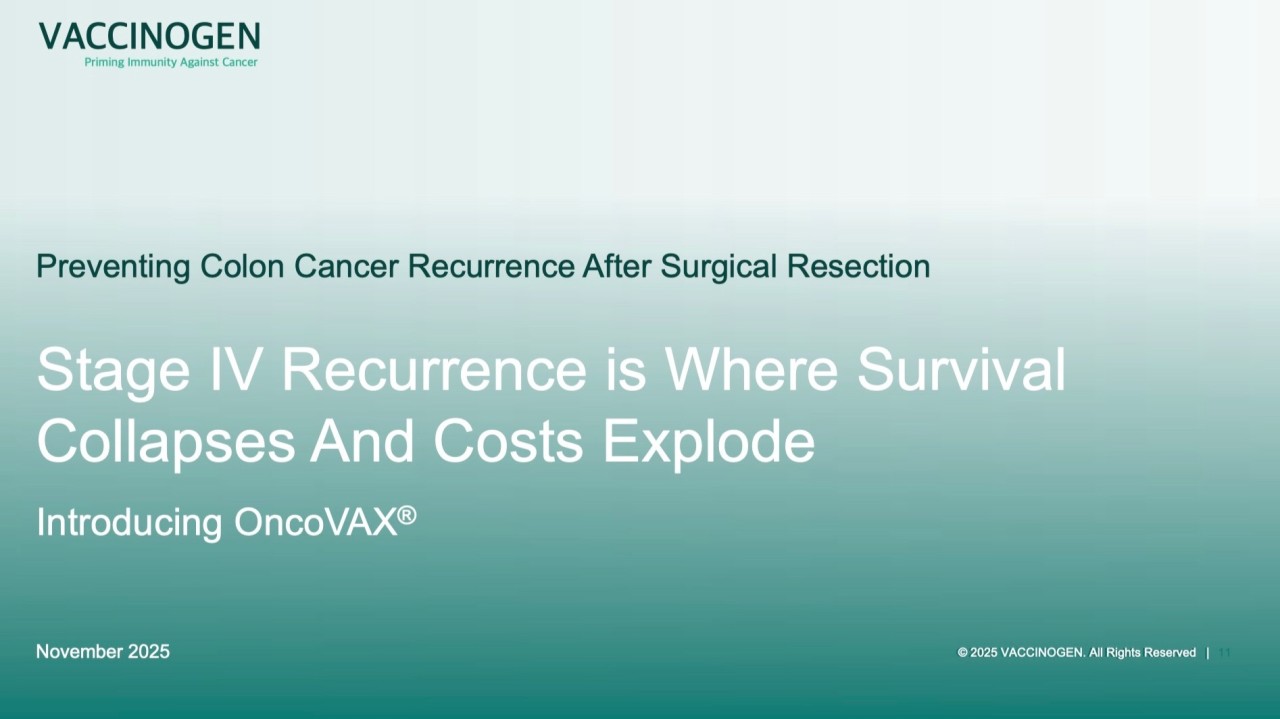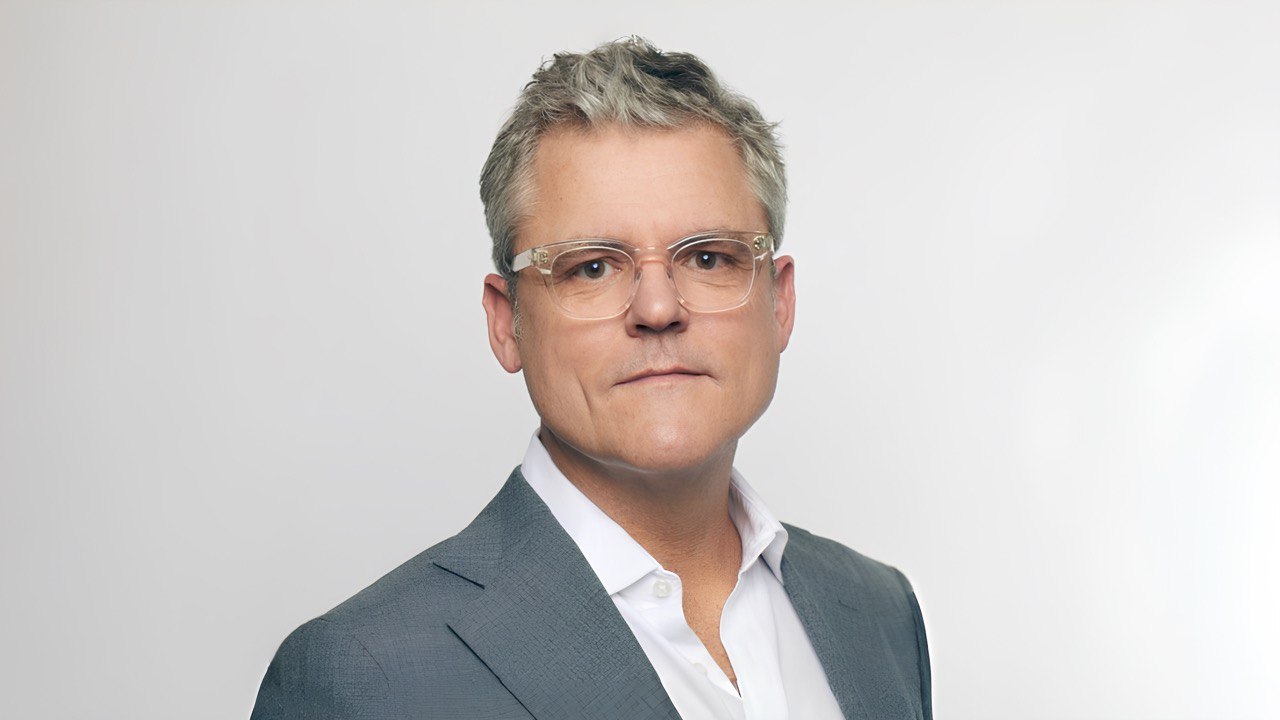David Oxley, CEO of Vaccinogen and Member Board of Directors at Caladrix, shared a post on LinkedIn:
“Over the past two decades, few questions in oncology have carried such moral and scientific urgency as this one: Can we train the immune system to find and destroy residual colon cancer cells during the Stage II curative window and create long-lived protection that prevents recurrence altogether? And can we deliver this transformational value sustainably?
This viewpoint underpins the science and purpose behind a completed Phase III trial evaluating OncoVAX, an autologous tumor-derived immunotherapy designed to act precisely at that curative window, when the immune system can be trained to achieve what later-stage interventions cannot. And to do so at a fraction of late-stage disease treatments.
As global health leaders and investors call for value-based, common-sense innovation that delivers durable efficacy and affordability, OncoVAX stands as a model for how public health, capital, and translational science can converge to transform outcomes for patients that actually lower the cost of care.
Across our field, extraordinary leaders continue to advance this shared mission: A2 Healthcare Corporation, Antoine Papiernik, Candriam, Christopher Arendt, PhD, Garrett Rhyasen, PhD, Gilad Glick, Graziano Seghezzi, Hiroki Matsushima, Johan Hueffer, Khaled Sarsour, Linden Thomson, CFA, Mark Cobbold, Novo Holdings, Ronny Gal, Sofinnova Partners, Stacy Feld, Teresa Bitetti, and Zeshaan Rasheed l OncoDaily
Their collective work exemplifies what is possible when science, capital, and human purpose align to bring forward a new generation of immune-based therapies that are precise, durable, and affordable.
Our collective challenge, as Patrick Temple-West of the Financial Times has aptly observed, is to ensure that breakthrough science remains both sustainable and accessible.
The mission behind OncoVAX reflects exactly that alignment: to intervene early, to prevent recurrence before it begins, and to deliver long-lived immune protection within reach of every patient.

Stage II Colon Cancer: How OncoVAX Trains the Immune System to Destroy Residual Disease During the Curative Window Enabling Long-Lived Immunity
For decades, exceptional individuals across the public and private sectors of science and clinical development have worked to answer one of oncology’s most enduring questions: Can an autologous immunotherapy be developed that achieves a functional cure and long-lived immunity in early-stage colon cancer, and can it be delivered to patients at a fraction of the cost of today’s complex medicines limited to end-stage disease treatment?
Before examining this question, it is useful to review some background. Colon cancer is classified into four stages based on how deeply the tumor has invaded the bowel wall and whether cancer cells have spread to lymph nodes or distant organs. Stage I disease is confined to the inner layers of the colon and is routinely cured with surgery.
Stage III and Stage IV disease involve lymph-node or distant-organ spread and are treated with chemotherapy, immunotherapy, and ultimately palliative care. Despite progress in combating advanced stages, mortality remains, demanding that we accelerate scientific innovation and shift our focus toward earlier intervention that prevents recurrence.
Between these two extremes lies Stage II disease, a middle ground where the visible tumor is surgically removed, yet microscopic remnants of this heterogeneous disease can remain hidden from scans, from the surgeon’s trained eye, and from the immune system that acts as the body’s natural defence.
After surgery, many patients are declared clinically ‘disease-free.’ In practice, surgery often removes only the visible tumor mass. Thousands of microscopic malignant variants can remain behind. This residual disease is unique to each patient, reflecting the complex and evolving biology of colon cancer. Each tumor is a genetically distinct mosaic capable of adapting, evading detection, and driving recurrence years later. This is why nearly one in three patients with Stage II disease relapse within two to five years of surgery, returning as metastatic Stage IV disease.
Given this, it is time to pivot our thinking and apply common-sense science that leverages immune-mediated residual cancer killing and long-lived immune-mediated prevention. The hope lies not in chasing disease recurrence after it appears, but in arming the immune system during the curative Stage II window.
We can train the immune system to recognize what surgery leaves behind and to mount a durable defence that prevents recurrence altogether. Treating patients at this stage represents the greatest opportunity window for meaningful innovation. It is the period when the immune system can attack and destroy thousands of residual tumor variants unique to each patient and establish long-lived memory against recurrence.
With the advent of autologous immunotherapy and modern manufacturing, we can now act within this curative window. This is the science behind OncoVAX. The objective is to intervene at Stage II, when the immune system can be trained to prevent recurrence before it begins. OncoVAX represents a shift from reaction to cancer’s spread to the destruction of residual disease. It leverages the body’s own immune intelligence to maintain long-term protection and prevent recurrence.
Behind this vision stands one notable individual who has refused to give up: Dr. Michael G. Hanna, Jr. is a pathfinder behind the science of autologous tumor immunotherapy. From his days leading the National Cancer Institute to today, he exemplifies what scientific rigor, dogged persistence, intellect, and moral clarity can achieve when the goal is not incremental progress but a cure itself.
In a completed Phase III clinical trial published in The Lancet, his science demonstrated a statistically significant improvement in disease-free survival among Stage II colon cancer patients compared with controls. A subsequent review of the trial data that appeared in Human Vaccines and Immunotherapeutics reported recurrence-free survival extending beyond fifteen years.
These findings confirm that the therapy induces durable immune memory capable of long-lived tumor surveillance. The results form the foundation for the planned OncoVAX FDA pivotal trial, which will be conducted under Special Protocol Assessment and Fast Track designation, to confirm these findings in a registration-ready global trial format.
From a public-health lens, this common-sense approach is all about preventing colon cancer at an earlier stage. Once patients relapse into Stage IV disease, the five-year relative survival drops dramatically, and most enter a palliative phase where median survival is measured in months rather than years.
At the same time, the cost of treating metastatic colon cancer places a heavy, unsustainable burden on the healthcare system, often reaching hundreds of thousands of dollars per patient when accounting for prolonged therapies, hospitalizations, and end-of-life care.
Today, our nation’s health leadership, including Health and Human Services Secretary Robert Kennedy Jr., FDA Commissioner Marty Makary, and Vinay Prasad, MD MPH has inspired all of us to reframe our thinking and apply a common-sense, value-based approach to drug development and affordable market access.
This refreshingly new reframing and radically simple lens reflects a true common-sense commitment to align innovation with the public good, to deliver world-class and affordable, evidence-driven medicines that reduce the unsustainable cost burden while advancing national health priorities.
OncoVAX stands squarely within this ethos. It is underpinned by a consortium-driven structure that transforms the economics of autologous immunotherapy. The first FDA-approved autologous cancer immunotherapy exceeded two hundred fifty thousand dollars per quality-adjusted life year, reflecting the complexity of historic individualized immunotherapy.
OncoVAX, by stark contrast, is engineered to achieve an estimated twelve thousand dollars per quality-adjusted life year. It aligns with the principles of value-based, durable care championed by common-sense health leaders in Washington. This approach also aligns with the Food and Drug Administration’s new Commissioner’s National Priority Voucher initiative, introduced in June 2025, which accelerates review for therapies that advance national health interests and expand access to affordable innovation.
This is the defining purpose of OncoVAX and the people behind it. To act with scientific rigor and common sense in early-stage solid-tumor disease, delivering autologous immunotherapy capable of destroying residual early-stage disease, delivering long-lived immune protection, and to do so sustainably. Because we can. And because, as a nation devoted to curing disease, why not? Thank you to all those pushing us to act with purpose and urgency.
David Oxley Frederick, Maryland
Acknowledgments
With gratitude to the many whose science, leadership, and innovative drive continue to redefine the frontier of immuno-oncology and value-based healthcare.
References
Vermorken JB, Claessen AME, van Tinteren H et al. ‘Active specific immunotherapy for stage II and stage III human colon cancer: a randomised trial.’ The Lancet. 1999; 353 (9166): 1585–1592. Link
Hanna MG Jr, Howard JD. ‘A key to the backdoor into the castle: The clinical ramifications of immunoediting driven by antigenic competition.’ Human Vaccines and Immunotherapeutics. 2017; 13 (7): 1579–1585. Link
U.S. Food and Drug Administration. (June 17, 2025). FDA to Issue New Commissioner’s National Priority Vouchers to Companies Supporting U.S. National Interests. Link.”
You can read more posts on Colon Cancer on OncoDaily.


